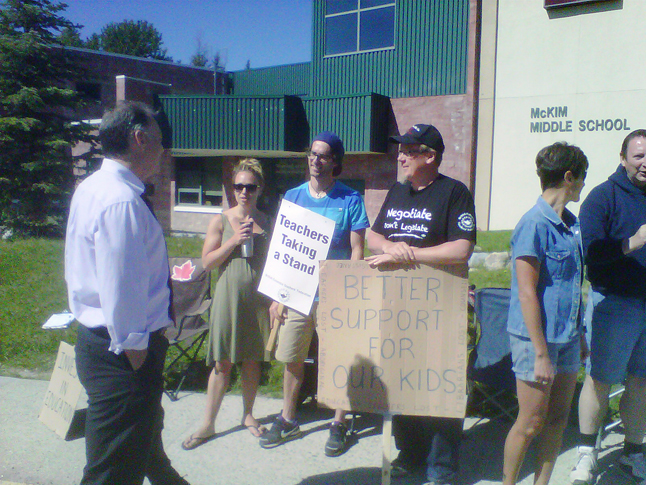
By David F. Rooney
Teachers across the province are voting on whether to go out on a full-blown strike, even though they have virtually no strike fund.
Without broad and deep pressure from an outraged public the teachers are unlikely to achieve their goals through strike action. But at this point — for many teachers — it’s now a matter of principle.
BC’s teachers are demanding action on class size and composition and a fair wage. Education Minister Peter Fassbender says the government has put a fair wage offer on the table that is in line with similar agreements covering public-sector workers. He said the offer includes a $1,200 signing bonus if a deal is reached before the end of June.
News reports from the Lower Mainland say the union has dropped its wage demand by one percentage point, bringing the request into the range 12 per cent over four years. The employer has been offering 7.3 per cent over six years.
Over the past five years teachers received pay increases of:
2.5% in 2006;
2.5% in 2007 ;
2.5% in 2008;
2.5% in 2009; and
2 % in 20010.
That agreement also saw a $3,700 signing bonus, 1.5% for salary harmonization and 2% for a salary indemnity plan.
This agreement was one year longer than the other public sector agreements. As a result, the other sectors had a two-year mandate called co-operative gains which saw settlements between 3 and 4 % over two years, in some cases with the increases being partially funded by efficiencies in the collective agreement. The other public sector unions then went into the economic stability mandate and all settlements to date have been for the pattern of 5.5% over 5 years with an opportunity for a dividend depending upon the performance of the economy.
If there is value in having the BCTF contract line up with the other public sectors, the settlement should be for one year of the co-operative gains mandate followed by the five-year economic stability mandate. BCPSEA has that six-year proposal on the table at this time.
The vote is acquiring an urgency now that the province has reached an agreement with Canadian Union of Public Employees (CUPE) support staff.
“We’re pleased to conclude a strong agreement that improves education for students and benefits our 27,000 members,” Marcel Marsolais chairman of CUPE’s K-12 Presidents’ Council, which negotiated the agreement, said in a statement on the union’s website. “This agreement is a significant improvement over our last one since increases are provincially funded and will remove pressure on school boards.”
The tentative agreement — it is not yet ratified — is for a five-year term from July 1, 2014 to June 30, 2019 and includes provincially funded wage increases of 5.5%. Increases over five years. (Please click here to view the unratified agreement.)
CUPE also received increased hours for education assistants; improvements to extended health benefit plans through standardization; an Employee Support Grant in recognition of lost wages for CUPE members who do not cross legal picket lines; and a commitment to implement a job evaluation plan to address recruitment and retention issues.
MLA Norm Macdonald, himself a former teacher and elementary school principal in Golden, visited striking teachers in Kimberley. They have his sympathy and solidarity. The government’s refusal to offer the BC Teachers Federation a decent deal is, he told The Current, “part of a pattern that is deliberately provocative.”
The BCTF’s province-wide strike vote is to be concluded on Tuesday. Meanwhile, teachers continue with their rotating strikes. Revelstoke’s four schools will be closed on Friday as local Revelstoke Teachers’ Association members walk off the job. They could soon be off work for the rest of the academic year.



